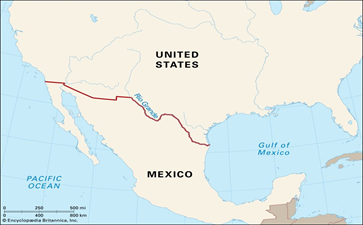

9th January 2023 (8 Topics)
Context
The United States has announced that it will extend COVID-19 pandemic-era restrictions, known as ‘Title 42’, to expel migrants from Nicaragua, Cuba and Haiti caught crossing the U.S.-Mexico border back to Mexico that would block more nationalities from seeking asylum in the United States.
Background:
- At the start of the COVID-19 pandemic in March 2020, U.S. health authorities issued Title 42 to allow border agents to rapidly send migrants crossing the S.-Mexico border back to Mexico or other countries.
- The order was implemented under Republican former President Donald Trump, whose administration sought to greatly curtail both immigration.
- The U.S. Centres for Disease Control and Prevention (CDC) has mentioned the time it was needed to stem the spread of COVID-19 in crowded detention settings.

About the ‘Title 42’ policy:
- Title 42 is a clause of the 1944 Public Health Services Law that "allows the government to prevent the introduction of individuals during certain public health emergencies.
- The Title 42 process has allowed the U.S. to expel upward of two million migrants from the border including a surge of Haitian asylum seekers last year, Venezuelans who have been coming in larger numbers, and Mexicans, who make up the bulk of unauthorized migrants in the Southwest.
Why it is expanded by the US government?
- The move builds on a policy launched in October that began expelling Venezuelans but at the same time allowed thousands of migrants from that country to enter by air if they applied from abroad and could demonstrate they had a U.S. sponsor under a new “humanitarian parole” program.
Why did the Supreme Court rule on Title 42?
- In April 2022, the court has announced that it would end Title 42, saying it was no longer needed to limit the spread of COVID-19 in light of vaccines and other medical advances.
- But a federal judge in Louisiana blocked the termination after a legal challenge brought by a group of two dozen U.S. states with Republican attorneys general who argued that increased migration would saddle their states with costs.


